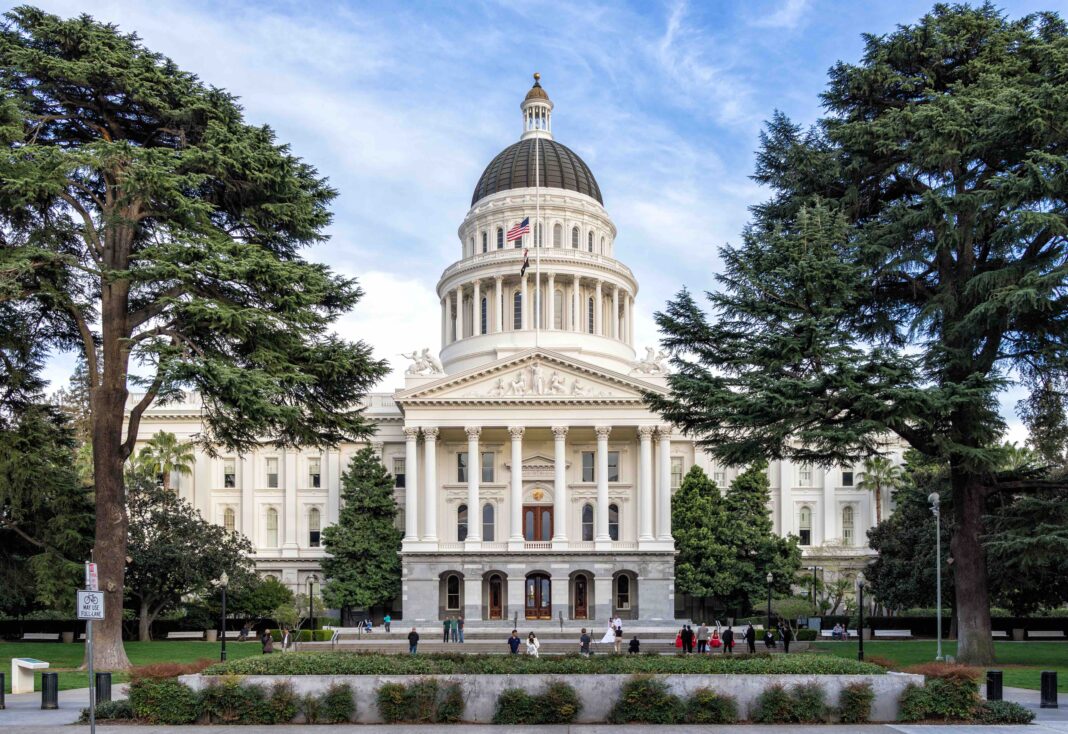Gov. Gavin Newsom unveiled his proposed budget for the 2021-22 fiscal year Friday, touting record investments in education and a $15 billion budget surplus in spite of the economic uncertainty wrought by the coronavirus pandemic.
The $227 billion proposed budget, with a $164.5 billion general fund, represents a stark difference in the state’s financial outlook from last year, when plummeting sales, personal income and corporate tax revenue during the pandemic’s early days resulted in a $54 billion budget deficit.
According to Keely Bosler, the state’s Director of Finance, the state received more revenue than expected over the last year after misjudging the depth of the pandemic-induced recession and that the stock market would maintain its strength.
“Not an easy journey,” Newsom said Friday about the process of developing the proposal. “A challenge the likes of which we’ve never experienced in such a contracted period of time. Numbers changed but our values did not.”
Newsom said his focus when drafting the budget centered on getting state residents vaccinated against the virus as quickly as possible while spurring the state’s economic recovery and reopening schools across the state.
The budget includes $85.8 billion for the state’s schools, the largest investment in education in the state’s history, according to Newsom.
The proposed funding would allow the state to avoid making permanent education cuts or layoffs while recruiting and training new teachers, keeping college and university tuition and fees at current levels and ensuring all school staff and students have access to coronavirus testing and vaccination in the coming months.
At the end of December, Newsom announced that the state would invest some $2 billion in reopening schools in February for students in transitional kindergarten through second grade and progressing into higher grades later into the spring.
While schools in 41 counties across the state were holding in-person classes to some extent, as of November, Newsom said state officials aim to use the $2 billion and incentives for additional resource allocation to resume in-person classes statewide.
Newsom added that officials wouldn’t shy away from taking a more heavy-handed approach with school districts that have been more hesitant to reopen in the coming months.
Superintendents from seven of the state’s largest school districts, including those in San Francisco and Oakland, expressed such hesitation earlier this week in a letter to Newsom, suggesting that the $2 billion plan would be implemented inequitably and included vague markers for reopening such as what constitutes a “safe school environment.”
“I think this budget reflects the vast majority of their concerns,” Newsom said Friday about the letter, adding “we share the same goal for safe reopening of in-person education.”
The proposed education budget also includes funding for mental health services for students, extending when schools are in session to make up for the learning lost as result of the pandemic and the development of open-sourced textbooks as a way of disrupting “the racket that is textbooks in this country,” Newsom said.
The budget would utilize $6.7 billion in federal education funding as part of its allocation to the state’s schools.
California State University Chancellor Joseph Castro said the budget “provides a welcome reinvestment in the California State University and demonstrates his continued belief in the power of public higher education in developing future leaders of our state and improving the lives of the residents of California.”
The California Faculty Association, which represents staff at all 23 CSU campuses, described its reaction to the proposal as “encouraged.”
“This proposal is the opening move in the budget process that includes a May revise and final approval in June,” the CFA said in a statement. “CFA looks forward to working with the California state legislature and Gov. Newsom over the next several months to secure necessary funding to enable us to best serve CSU students.”
Outside of education, the proposed budget includes $4.4 billion to continue the state’s expansion of coronavirus testing, contact tracing and vaccination efforts.
Newsom lamented that California has lagged behind many other states in its coronavirus vaccination efforts, arguing that it is somewhat out of his control and that the state itself has not received any vaccine doses, which are being distributed directly to local health jurisdictions and health care systems.
State officials have set a goal of administering 100 million vaccines by the end of next week, according to Newsom, who noted roughly 2 million vaccine doses have been received in the state as of Thursday.
“The predicate in terms of our focus on a budget is the reality of getting out of the freezers, and administering into peoples’ arms, these vaccines,” Newsom said. “We must do that in order to safely reopen, for in-person instruction, our schools; to reopen our small businesses as well as businesses large and small all across the state of California.”
Newsom said he has asked the state legislature to pass an immediate funding package by the end of the month to allocate funding for reopening schools, issuing grants and fee waivers to small businesses and extending the state’s moratorium on evictions, which expires Jan. 31.
Assemblyman David Chiu, D-San Francisco, who authored the eviction moratorium bill last year, lauded Newsom for his proposal, including the $1.75 billion allocated to sheltering the state’s unhoused residents long-term.
“Despite an ongoing pandemic and difficult economic circumstances, Governor Newsom has used this budget to make wise investments and safeguard our social safety net,” Chiu said, adding “while no budget is perfect, this proposal is good news for California.”
The immediate funding package would also include $600 stimulus payments to 2019 taxpayers who received an earned income tax credit from the state and 2020 taxpayers who have Individual Taxpayer Identification Numbers.
Residents with an annual income of $30,000 or less are eligible for the tax credit, while ITIN taxpayers include people like undocumented residents who were not eligible for federal stimulus payments.
California Republican Party Chair Jessica Millan Patterson suggested Newsom should have also used the state’s one-time surplus to support residents who have been hit hard in their wallet by the pandemic.
“His shutdowns and lack of leadership in handling COVID-19 has put many Californians in dire situations – foreclosures, evictions, isolation from family and friends and a lost academic year for millions of school children,” Millan Patterson said in a statement.
Bay Area leaders praised Newsom’s budget for investing in the state rather than making dramatic cuts amid the pandemic.
“In addition to all the challenges we have been facing for years, right now in this moment, our workers, families, and young people are in desperate need of immediate relief,” San Francisco Mayor London Breed said. “By proposing direct investments to working people, small businesses, and our schools, the governor is doing just that.”
“Even amid this pandemic, homelessness will persist as the lasting crisis of our generation,” San Jose Mayor Sam Liccardo said. “Mayors throughout the state urged Governor Newsom to remain steadfast in his commitment to housing solutions, and he stepped up.”
“This budget wisely commits to assistance for small businesses, greater support for public health programs, a good working plan to reopen schools, as well as addressing non-COVID related threats like climate change impacts,” state Sen. John Laird, D-Santa Cruz, said.
The full budget proposal – which also includes billions in funding for wildfire preparedness, tax credits and loans for businesses and early childhood care – can be found here.









